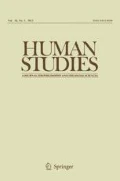Abstract
This paper examines the political significance of discursive activity in the private sphere in the thought of Hannah Arendt, Václav Havel, and Victor Klemperer. Against criticisms of Arendt which claim that she pays too much attention to the public sphere and consequently misses the importance of the private sphere in her analysis of political action, this paper highlights important insights in Arendt’s writing on family and friendship and the ability of these relationships to act as havens where discourse can thrive. What emerges from the analysis is a rich agonistic discourse ethics. The paper employs the respective thought of Havel and Klemperer to highlight Arendt’s work on the political significance of private virtues for promoting an awareness of responsibility. This position is then defended against the criticisms of discourse ethics offered by Chantal Mouffe.
Similar content being viewed by others
References
Arendt, H. (1978). Life of the mind. New York: Harcourt.
Arendt, H. (1995). Men in dark times. San Diego: Harvest Books.
Arendt, H. (1998). The human condition. Chicago: University of Chicago Press.
Arendt, H. (2005). Introduction into politics. In J. Kohn (Ed.), The promise of politics. New York: Shocken Books.
Aschheim, S. (2001). Scholem, Arendt and Klemperer; Intimate chronicles in turbulent times. Indiana: Indiana University Press.
Benhabib, S. (2007). Situating the self. Cambridge: Polity Press.
Citizen Havel Goes on Vacation. (2006). DVD, Chicago Motion Picture Studios, Chicago, directed by Adam Novak.
Collins, S. (2015). The core of care ethics. Hampshire: Palgrave Macmillan.
Dossa, S. (1984). Arendt on Eichmann. The Review of Politics, 46(2), 163–182.
Elshtain, J. B. (1992). A Man for this season. Perspectives on Political Science, 21(4), 207–212.
Fry, K. (2009). Hannah Arendt; A guide for the perplexed. London: Continuum International Publishing Group.
Glover, J. (1999). Humanity: A moral history of the twentieth century. London: Jonathan Cape.
Goldfarb, J. C. (2006). The politics of small things. Chicago: University of Chicago Press.
Havel, V. (1985). The power of the powerless (P. Wilson, Trans.). Armonk, NY: M. E. Sharpe.
Havel, V. (1989). Letters to Olga (P. Wilson, Trans.). New York: Henry Holt.
Havel, V. (1997). ‘New year’s address to the nation’ The art of the impossible (Paul Wilson, Trans.). New York: Alfred A. Knopf.
Hayden, P. (2015). From political friendship to befriending the world. European Legacy, 20(4), 745–746.
Jacobitti, S. (1991). The public, the private, the moral: Hannah Arendt and political morality. International Political Science Review, 12(4), 281–293.
Judt, T. (1988). The dilemmas of dissidence: The politics of opposition in East-Central Europe. Eastern European Politics and Societies, 2, 185–240.
Klemperer, V. (2006). The language of the third Reich (M. Brady, Trans.). London: Continuum Books.
Kristeva, J. (2001). Hannah Arendt (R. Guberman, Trans.). New York: Columbia University Press.
Mouffe, C. (2005). Democratic paradox. London: Verso.
Pynsent, R. (1994). Questions of identity; Czech and Slovak ideas of nationality and personality. London: Central European University Press.
Schutz, A., & Sandy, M. (2015). Friendship and the public stage: Revisiting Hanah Arendt’s resistance to ‘political education’. Educational Theory, 65(1), 21–38.
Steinberg, J. (2002). All or nothing: The axis and the holocaust 1941–43. London: Routledge.
Young-Bruehl, E. (2006). Why Arendt matters. New Haven: Yale University Press.
Author information
Authors and Affiliations
Corresponding author
Rights and permissions
About this article
Cite this article
Brennan, D. Considering the Public Private-Dichotomy: Hannah Arendt, Václav Havel and Victor Klemperer on the Importance of the Private. Hum Stud 40, 249–265 (2017). https://doi.org/10.1007/s10746-017-9424-x
Published:
Issue Date:
DOI: https://doi.org/10.1007/s10746-017-9424-x




